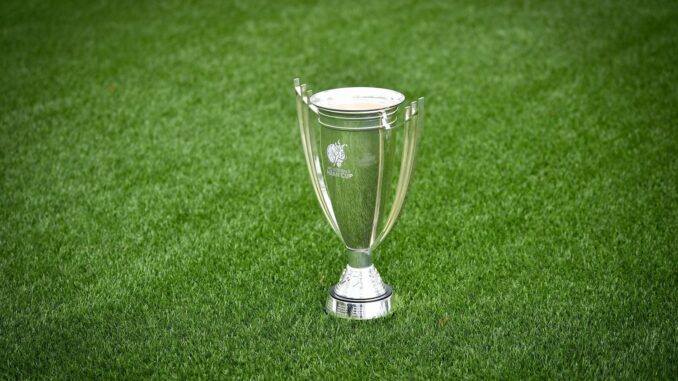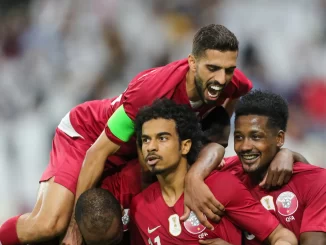
The 20th edition of the AFC Women’s Asian Cup begins this week in India – hosting the tournament for the first time since 1979 – featuring an expanded tournament of 12 teams vying not just for the title, but one of five coveted FIFA Women’s World Cup berths.
On Episode 76 of The Asian Game podcast we were joined by a panel of women’s football experts – Samantha Lewis, Tom Engelhardt and Kat Khosrowyar – to preview all 12 teams.
Below our experts give their verdict:
GROUP A
India
Paul Williams: You look at the group that they’ve landed in, and there’s a great opportunity for them to actually do something and get out of this group.
They played Chinese Taipei recently in a friendly and won that game 1-0. So that gives them a reasonable form line to show that they’re more than capable of matching it with them. Potentially they’ll struggle against China, but against Iran as well, who were playing in the tournament for the first time, then, you know, at home, you’d think that they’d fancy themselves
The disappointing aspect for them is that they’ve got the home nation advantage, but they won’t have the home crowd advantage, of course, because unfortunately, because of COVID no crowds are allowed. And that’s, that’s a great shame, because it would have been a great occasion for so many people in India to come out and see the national team and give them that support.
So they won’t unfortunately have that. But I’ve got some hopes for India that they’ll certainly be able to get out of the group and it’ll be interesting to see what they can do from from that point on. I think anything from that point on is probably a bit of a bonus.
China
Tom Engelhardt: I think China, without any disrespect at all to the other teams in the group, I think China will be pleased that they’ve ended up in this group, because they will be confident that they can get results against all these teams, and they will be confident that they’ll win the group as well.
So I think that they should win the group. When they get to the knockout stage and start playing against the big teams, I think it’s going to be interesting to see how they hold up defensively because that was a massive problem for them at the Olympics.
Wu Haiyan, who is usually their captain and and best defender, is out for the tournament, and also they’ve sort of switched around the goalkeeping situation. So Peng Shimeng was the goalkeeper at the Olympics, she is not in the squad at all, and Zhao Lina, who was the goalkeeper probably three or four years ago is now back in the squad. So that will be really interesting.
I think China will make it to the semi finals, and from there I think it’s going to be quite difficult for them. Let’s say they played against Japan or someone like Australia or Korea I think will be quite difficult, although they did beat Korea in the Olympic qualifying playoff over two legs.
So I think on their day, and we saw it in Australia as well, they gave Australia a really tough match in Sydney. So I think on their day they can challenge the big teams, but it’s sort of difficult to see them winning the tournament I think but it’s going to be interesting as the new coach, a new era for China (begins).
Michael Church: The Chinese National Team, I think, is in it’s in a little bit of flux at the moment. Obviously didn’t do very well at the Olympics. Previous coach Jia Xiuquan was quite a polarising figure. He selected a very questionable squad, I think it’s probably the lightest way to put it, for the Olympics.
They went into that tournament without the likes of Shen Mengyu who’s playing in Scotland for Celtic, Tang Jiali, as well who’s at Tottenham. He went with a young squad that I think even people very closely associated with the team and with the Chinese FA were bewildered at some of his selections.
So it will be very interesting to see what the new coach does. Shui Qingxia, she is, I think, the first Chinese woman to coach the team and it’ll be interesting to see what different approach she brings to the whole procedure.
Chinese Taipei
Tom Engelhardt: As far as Chinese Taipei (is concerned) this is a team that was really a pioneering team. In the early early days of women’s football in Asia, they won the tournament, I think, three times in the early/late 70s, early 80s when it was just getting started. And they’ve never totally fallen off, they have missed a lot of Women’s Asian Cups in the last sort of 15 or 20 years, but they’ve never been easy beats in the Asian Football context.
I think it’s it’s a wait and see sort of situation for Chinese Taipei, they will be confident that they can get out of the group but so will everyone else.
Samantha Lewis: In the Olympic qualifiers, especially here in Sydney, I really liked the look of Chinese Taipei. I really enjoyed their style. I think they have some really fabulous players and with more time together, and the incentive of an expanded World Cup, perhaps their Federation are going to be investing a little bit more in their program as well.
Iran
Kat Khosrowyar: The two central defenders (Melika Mohammadi and Ghazaleh Banitalebi), they are very young, when I was the Under-19 team head coach, I got to coach these two players. And currently all my Under-19 team players are now officially senior national team players. So it’s a very young team. And their forward (Negin Zandi) she is, I believe she’s 18. Now, she was only 15-16 whenever she was on the Under-19 national team, but this this girl has some crazy speed, beautiful tactics and technique. And her head is purely football; the girl eats, breathes and sleeps football.
But in general, those are the three players that I love watching. I’ve been watching throughout the past year in the friendly games, but overall on the team you’re going to see some talented players and I hope it’ll be cohesive enough that they are able to work together very well on the field against such prominent teams.
I think Iran has a good chance of at least competing pretty hard with with the teams in the group, as well as being able to showcase what they what they’ve been working towards for a very long time. But they are the underdogs.
GROUP B
Australia
Samantha Lewis: Coming into the last couple of months, there’s been two sort of parallel storylines approaching the Asian Cup.
One has been, because we qualify as co-hosts for the Women’s World Cup, should we go into the Asian Cup quite experimental, should we bring in a bunch of new players and test them out, put them in a tournament setting and really test out and see who could potentially make that 2023 squad, which ultimately is the the tournament that we want to perform best in.
But in the last month or two head coach Tony Gustavsson has really ramped up his intentions to win the Asian Cup, and I think the squad selection that was announced earlier last week really sort of reflected that intention as well.
And by virtue of that, I think the larger football community here in Australia are really expecting the Matildas to win this.
I think anything below us getting to the final will probably be underperforming and there will be some questions asked not just because of the Matildas track record when it comes to the Asian Cup, making the last two finals and having lost to Japan both times.
But also, because of the players that we have at the moment and the form that some of them are in. Our captain is Sam Kerr, she has just made the final three of the FIFA Best women’s football awards.
Spearheaded by someone of that quality and surrounded by the kind of quality that she is, it will be really disappointing if the Matildas don’t at least make the final.
Thailand
Tom Engelhardt: Thailand, in terms of rankings, in terms of what they’ve done in the past, are the sort of second pot team in this group. And they would definitely be hoping to finish second in this group.
They have a new coach (Miyo Okamoto) from Japan, and I was actually speaking to Miranda Nild the other day, who’s the Thailand striker who has come through the American College system and is now playing in Sweden.
And she said that having a new coach from Japan has had an impact on how they look to play, they’re not going to be so focused on pace and physical attributes anymore, they want to play a different way. So that’s going to be interesting to see in the tournament.
Philippines
Paul Williams: I think what (Stajcic) brings is that he brings a professionalism that perhaps they haven’t had before. He comes from his time within Australia (where) he has he had that system around him, he had that ultra professional setup the entire time.
We know that a couple of these ‘minnow’ nations in Asia, they haven’t had that around the women’s set up before, and he’s bought that in and they’ve been in camp in America, and it is a predominantly a US based squad, they’ve been in camp since November playing matches very, very frequently against local against local US side.
So he’s had a great chance, even though he only appointed a couple of months ago, to get the team together for a lengthy period of time and he’ll be confident because (the tournament) going to 12 teams it throws up so many more options. Because it’s not just the top two from each group that advanced it’s also some of the third placed teams as well.
So as he said, every every goal is important, every goal concede is important, every game you play is super important. Every moment in this tournament is going to matter. And they’ll come up against a team’s like Indonesia that they’ll fancy themselves against, Thailand, a notionally a stronger team but ‘Staj will have this team well organised and he’ll be confident that they can they can perhaps surprise Thailand and and snatch that second spot.
Indonesia
Tom Engelhardt: Indonesia has been at this tournament before, but it was more than 30 years ago. And I think even even considering Iran, who have never played in the women’s Asian Cup, I think Indonesia is the biggest unknown quantity in the whole tournament.
Because, like Iran, I guess,(it’s) such a massive football country where there’s so much passion for the game, but the women’s game has really not been able to get going in Asia until now. So I think it’s fantastic that they’ve qualified, it’s a great opportunity for the team to sort of cement themselves in this sort of top level of Asian football.
But I really think they’re going to struggle to get results in this group. Because even beyond Australia, who are probably the top one or two teams in the competition, Thailand and the Philippines are really ambitious, experienced players, and they’re trying to qualify for the World Cups, I think it is going to be difficult for Indonesia.
Paul Williams: It’s a really young squad that they’ve named. I was looking (at their squad) and eight of their players that they’ve named, so an entire third of their squad, are teenagers, the youngest of which is 16. They’ve only got four players aged over 25 and they’ve got an average age of just 22.
That suggests, given that inexperience, they’re probably going to struggle in this tournament, but perhaps they’re taking a longer term view to this tournament, a little bit like what Sam was talking about with Australia. They know they’re going to struggle in this tournament, so they’re exposing a young generation that they hope will be able to then follow this side through over the next decade or so given how young some of them are.
So it’ll be really interesting to see how they perform given their inexperience.
GROUP C
Japan
Scott McIntyre: If you look at the squad on paper, Yui Hasegawa, (Saki) Kumagai, all the big names are there and the expectation from when the squad was announced was very much that this is the thing that that Japan has to win, there is no option for second place, they’re going in as one of the favourites and rightly so.
The experience that they do have should be enough. For me I think they go in as the favourites for the tournament, they should be considered that and I think anything less than then winning the tournament will be considered failure in Japan.
It’s a young squad, a lot of players coming into the group, although they have the core four or five players that are based across in Europe, there are some exciting young talents coming through, young talents like Jun Endo, who’s over in America now who’s a player with real great promise as well.
So I think, new coach, new year, the buzz around the league, there’s an expectation that this could almost be the start of the next generation of Nadeshiko success going forward. And it has to start now, with a win in this tournament.
Tom Engelhardt: Talking about these young players that are coming through, Jun Endo, Riko Ueki, Saori Takarada, these sort of age players, they’re all from the (Futoshi) Ikeda team that won the Under 20 World Cup, so he knows all these players.
He’s a new coach for this team, but he’s not a new coach at all to a lot of these players. So I think even though he’s had (only) two games, I don’t think that they going to take that much time to get going.
South Korea
Michael Church: The Koreans, you know, they don’t have the best track record in this competition; they’ve never won it. They have been a bit up and down, they’ve been improving lately.
They missed in qualification for the Olympic Games, they lost very narrowly to China in, I think it was March of last year, performed very well in that in that game against the Chinese. It was a very competitive game of football, but unfortunately, they missed out on going through to the Olympic Games.
They’re led by a very good player in Ji So-yun, who has obviously got huge experience and being very successful in her time in Chelsea. Colin Bell, I mean, I’ve not been following very closely the work that he’s been doing, but certainly he seems to be taking the team in the right direction.
Vietnam
Tom Engelhardt: Vietnam is probably, if we look at the the big teams in this tournament, they’ve all got new coaches, basically, in the last year or two. But Vietnam has probably been the most sort of consistent program anywhere in Asia in the last five or six years, they’ve had the same coach, mainly the same players.
But unfortunately for them they’ve got a really tough draw again. Four years ago in their group was Japan, Australia, and South Korea, which is like, you couldn’t possibly create a more difficult Asian Cup group than that. And they lost every game.
This time they’ve got Japan and South Korea, again. They’ll be confident about beating Myanmar, but the problem for them is realistically, they’re probably looking at the sort of one of the best third place teams is their way out of the group. But in order to get that they’re going to have to get the score down against Japan and South Korea, which in the past has been really difficult.
Myanmar
Tom Engelhardt: They have a winger called Win Theingi Tun. I saw her, I think five years ago in Vietnam, and actually Kat was there as well, because she was in the coaching staff for Iran.
In that tournament, it was qualifying for the 2018 Women’s Asian Cup and this winger from Myanmar, Win Theingi Tun, was unbelievably good. And every time I’ve ever seen her play, I think she’s always scored. She’s got a ridiculous record, she scored at something like 55 goals in 60 international matches, (and) the club record is even better.
She’s now playing for a club in India and I’m just really excited to see her get a chance to get World Cup quality opponents. She was as a teenager in the squad in 2014, but was sort of a substitute wasn’t really the main player. But for no other reason than her I’ll be looking out for Myanmar’s matches because, maybe she won’t be able to do it against the very best teams, but we’re gonna find out and I’m just excited to see her on this stage.
Photo: All India Football Federation
Listen to Episode 76 of The Asian Game podcast as we preview the 2022 AFC Women’s Asian Cup



